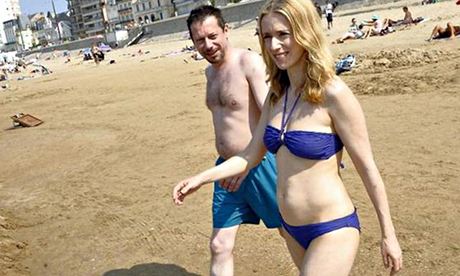THE BLUE ROOM (Le chamber bleue)
Sundance Selects
Reviewed for Shockya by Harvey Karten. Data-based on Rotten Tomatoes
Grade: B+
Director: Mathieu Amalric
Screenplay: Mathieu Amalric, Stéphanie Cléau, novel by George Simenon
Cast: Mathieu Amalric, Léa Drucker Stéphanie Cléau, Laurent Poitrenaux, Serge Bozon, Blutch
Screened at: Review 2, NYC, 9/18/14
Opens: October 3, 2014
In a recent episode on the Emmy-winning TV show “The Good Wife,” the lawyer played by Josh Charles is shot dead in the courtroom by his own client. Americans like jury trials with such melodrama. But the French, or at least the audience prepared for engaging fare that challenges the mind as well as the heart, do not require shock and awe. In “The Blue Room,” a major segment of the all-too-brief psychological thriller takes place in both a pre-trial chapter and the final courtroom arguments. Nobody gets shot, no jurors are around for attorneys to manipulate. A small panel of judges is all that’s needed, and what’s more you don’t get a lawyer or a prosecutor jumping up every minute to shout “objection!”
How then is tension so aptly created by Mathieu Amalric, who directs, co-wrote and stars in “Le chamber bleue?” Amalric brings on the heat by supplying not just a whodunit mystery, nor is the film Hitchcockian in the sense that the audience knows the guilty parties from the start. Instead, “The Blue Room” is a who-done-what. We in the audience know that a crime has been committed, perhaps a murder, but we not only do not know the identity of the killer. We don’t know even who got killed! This is pretty much an original concept, and it works, especially when you’re starring an A-list performer like Amalric, who is not afraid of appearing in full frontal and back nudity despite being no Clive Owen, and acting out the role with a girlfriend who is taller than he is. It’s not easy to size up the Amalric body when you’re concentrating on his French-bulldog eyes, that look upon the proceedings, often without emotion, and yet appear that they’re about to pop out of his head.
“The Blue Room,” which played in Cannes un certain regard department and which is favored by an excellent score in the soundtrack, comes to us on an unusual 1:1.33 aspect ratio to symbolize the claustrophobic, or at least the insular character of the piece. Until the trial scene it is largely a two-hander that could conceivably be performed on the stage involving Julien Gahyde (Mathieu Amalric), a successful tractor salesman living in a small French town and married to Delphine (Léa Drucker) and his lover, Esther Despierre (Stéphanie Cléau), married to a pharmacist who may be near death from natural causes. They conduct assignations in a hotel when the husband, Nicolas, is away, not appearing to care that in a small town everyone knows your business.
The sex scenes are graphic enough, at one point showing the two intertwined in bed, particularly appealing for the choreography of the intimacy. (In other words, they don’t simply jump into the sack.) She would like to divorce pending his agreement to do same with his spouse, asking flirtatiously “if we were both suddenly free” what kind of future they might have. For his part, the answer is more nuanced: he tells her, in effect, that were they married, things would not be as exciting as they are now.
Aside from the deliberately closed-in aspect ratio, “The Blue Room” is non-linear, a necessary device if we in the audience are to wonder who is the criminal and, indeed, what is the crime? Colors are pronounced, from the redness of the towel that Esther hangs on the balcony to signal when it’s OK for Julien to meet her, the blue on the walls, the drop of blood that falls from Julien’s lip when Esther playfully bites him. From the scenes involving Julien at home, we’re not sure that his wife is aware of the affair, but everyone else in the town seems to be knowledgeable. Julien’s love for his small daughter is obvious and could play a part in Julien’s motivations.
Formally, the direction is spot-on, every scene the product of careful planning and execution, and the conclusion, though satisfying, leaves us with more questions than answers. And that’s how it should be.
Unrated. 76 minutes. © 2014 by Harvey Karten, Member, New York Film Critics Online
Story – B+
Acting – A-
Technical – A-
Overall – B+

